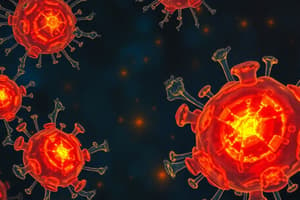Podcast
Questions and Answers
What role do Killer T cells play in the immune response?
What role do Killer T cells play in the immune response?
- They stimulate B cells to produce antibodies.
- They destroy infected cells through direct enzyme action. (correct)
- They regulate the immune response of other immune cells.
- They enhance the process of phagocytosis.
What function do Helper T cells serve in the immune system?
What function do Helper T cells serve in the immune system?
- They produce interferons to enhance virus replication.
- They suppress the immune response.
- They stimulate the production of antibodies. (correct)
- They directly kill cancer cells.
Which T cells are important for memory in later infections?
Which T cells are important for memory in later infections?
- Suppressor T cells
- Helper T cells
- Killer T cells
- Memory T cells (correct)
What is the primary purpose of Suppressor T cells?
What is the primary purpose of Suppressor T cells?
What type of cells do sensitised B lymphocytes produce after encountering a specific pathogen?
What type of cells do sensitised B lymphocytes produce after encountering a specific pathogen?
What do antibodies do during an immune response?
What do antibodies do during an immune response?
How do Helper T cells affect phagocytosis?
How do Helper T cells affect phagocytosis?
Which of the following best describes the effect of interferon produced by Helper T cells?
Which of the following best describes the effect of interferon produced by Helper T cells?
What type of immunity is developed through recovering from an illness?
What type of immunity is developed through recovering from an illness?
What is the primary function of plasma cells produced by sensitised B-cells?
What is the primary function of plasma cells produced by sensitised B-cells?
Which of the following statements about passive immunity is true?
Which of the following statements about passive immunity is true?
How do antibodies produced by cloned B-cells function in the immune response?
How do antibodies produced by cloned B-cells function in the immune response?
What is a key difference between primary and secondary immune responses?
What is a key difference between primary and secondary immune responses?
What role do memory cells play in the immune system?
What role do memory cells play in the immune system?
How do sensitised B-cells contribute to the immune response after an infection?
How do sensitised B-cells contribute to the immune response after an infection?
What is a characteristic of antibodies passed from mother to baby?
What is a characteristic of antibodies passed from mother to baby?
Study Notes
Immune Response
- Antigens are presented on the surface of macrophages, infected cells and cancer cells.
- T-cells are responsible for cell-mediated immunity.
- Killer T cells destroy infected cells by attaching to antigens on the cell surface membrane and destroying them through direct enzyme action.
- Helper T cells stimulate other cells involved in the immune response, for example, they stimulate B cells to divide and promote phagocytosis.
- Suppressor T cells suppress the immune response when required and prevent autoimmune responses.
- Memory T cells circulate in the body fluids and can respond rapidly to future infections by the same pathogen.
Antibody-Mediated Immunity
- Antibodies are produced by B-cells and neutralize pathogens.
- Antigens sensitize specific B lymphocytes, which then produce plasma cells and memory cells.
- Plasma cells produce large numbers of antibodies.
- Memory B cells respond rapidly to future infections by the same pathogen.
Types of Immunity
- Passive immunity is acquired through pre-made antibodies from other sources.
- Antibodies passing from a mother to a baby across the placenta or through breast milk.
- Antibodies made in another individual and injected as a serum.
- Active immunity is developed through exposure to pathogens.
- Natural active immunity: Immunity developed through having had the disease.
- Acquired (artificial) active immunity: Immunity gained through vaccination.
- Primary immune response is slower to develop and usually involves disease symptoms.
- Secondary immune response is rapid and strong, often preventing symptoms.
Studying That Suits You
Use AI to generate personalized quizzes and flashcards to suit your learning preferences.
Description
This quiz focuses on the critical components of the immune system, including the roles of T-cells and B-cells. It covers how these cells respond to antigens, produce antibodies, and ensure rapid responses to future infections. Test your understanding of cell-mediated immunity and the antibody production process.



